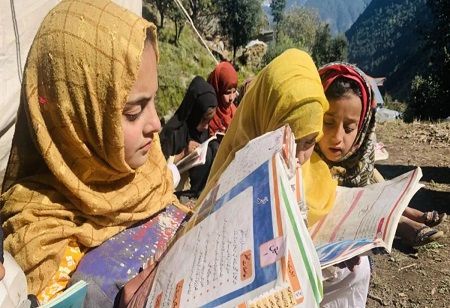The education sector in Pakistan-occupied Jammu and Kashmir (PoJK) is facing a significant crisis, as government schools continue to struggle with outdated curricula, poor infrastructure, and inefficiencies. Many parents are turning to private schools for better opportunities, but this shift has brought about its own set of problems, with private institutions facing increasing scrutiny for exploitative practices.
Residents of PoJK have expressed frustration over the state of government-run schools, which they say are failing to provide a modern education. One local resident explained, "Government schools in PoJK are grappling with a lack of modernization. The outdated syllabus, coupled with inefficient management and a culture of favoritism, has resulted in a decline in the quality of education". This has led many parents to seek alternatives in the private sector, hoping for a better educational experience for their children. However, the rising reliance on private schools has created its own set of challenges.
Private schools in PoJK, while offering more up-to-date textbooks and educational materials, are facing accusations of exploiting parents. The same resident highlighted, "In private schools, textbooks from Oxford and other publications are taught, while government schools follow a more limited, outdated syllabus". Despite this apparent improvement in curriculum, many parents have reported inflated fees and mandatory purchases of overpriced textbooks and stationery from private institutions. "Private educational institutions have become a mafia", the resident said, pointing to the high costs imposed on families.
One parent shared their frustration, saying, "Most private schools sell copies and other items at inflated prices. A copy worth 100 rupees is sold for 200 rupees, forcing parents to buy them. Everything, including stationery, is sold within the schools. They act like a mafia, robbing parents with both hands". This exploitative behavior has raised concerns about the fairness and transparency of private schools, which many families rely on as a way to escape the failing government education system.
In addition to these financial burdens, schools in PoJK, both government and private, are suffering from inadequate infrastructure. Basic amenities such as clean drinking water, functional toilets, and reliable electricity are frequently missing in many schools. The lack of proper facilities hampers students' ability to learn in a comfortable and conducive environment. Teachers, too, often lack the necessary training to provide quality education, further contributing to the crisis.
The education system in PoJK is not an isolated issue but part of a broader pattern of neglect in the region. Local governments frequently fail to prioritize the development of essential sectors such as education and healthcare, with funds often misallocated or poorly managed. This lack of investment in basic services has left the population in a state of underdevelopment and despair. The struggles in education are compounded by limited access to healthcare, poor job opportunities, and subpar living conditions.
As the education crisis deepens in PoJK, parents are caught in a difficult position. On one hand, they face the decline of government-run schools, which are hindered by outdated teaching methods and poor resources. On the other hand, they must navigate the high costs and exploitative practices of private schools, which have become increasingly difficult to afford. The education sector, along with other neglected areas like healthcare and infrastructure, continues to worsen the living conditions of PoJK's residents.
With inadequate resources, outdated curricula, and poor management, the education system in PoJK faces an uncertain future. As the government struggles to address these issues, the region’s education system remains in crisis, leaving parents and students searching for solutions in an environment of limited opportunity.

